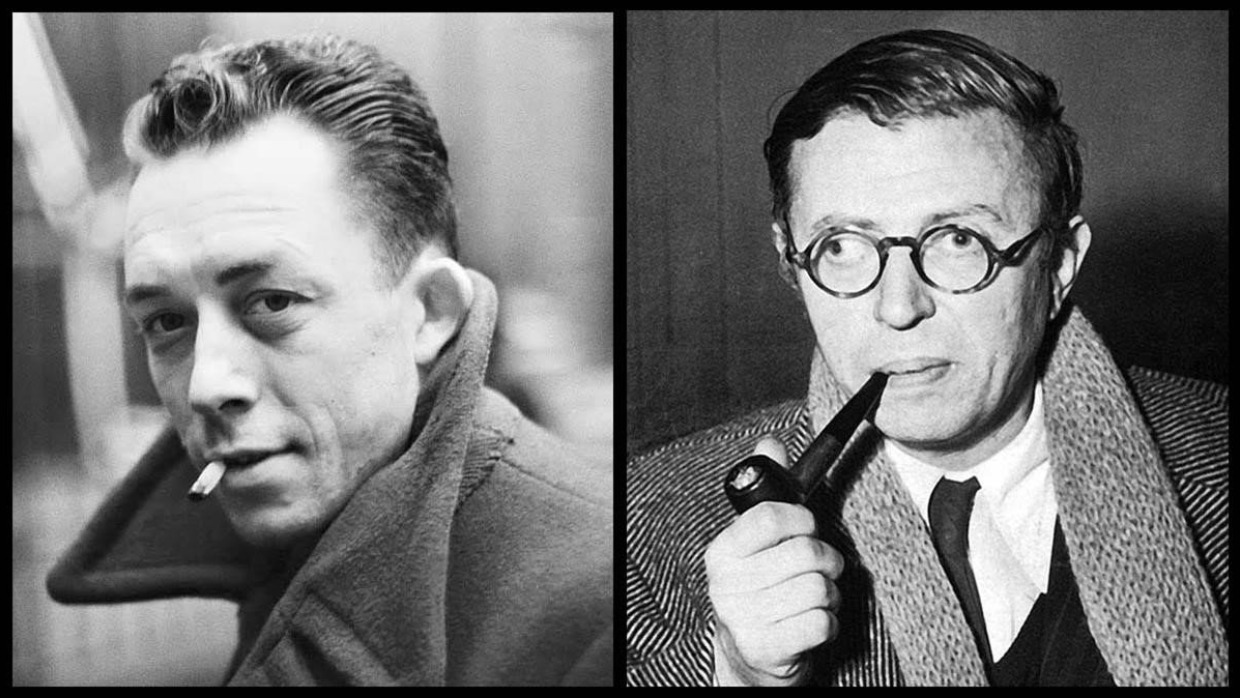 Iran’s Attack on Israel
Iran’s Attack on Israel


6 min read
The Hamas massacre reminded me of Jean-Paul Sartre’s immoral defense of terrorism as a weapon for the oppressed.
30 September 1956. Algiers. A young Muslim law student named Zohra Drif dresses up as a European and walks into an ice cream parlor full of French families enjoying the warm Sunday afternoon. She has a peach Melba at the bar, leaves a bomb in a bag and walks out. The bag detonates, killing three and maiming many others, including children.
The Age of Terror had begun.
 A still from the famous Milk Bar bombing scene in the film The Battle of Algiers (1966)
A still from the famous Milk Bar bombing scene in the film The Battle of Algiers (1966)
The question of Algeria’s independence from France instantly divided French and European intellectuals, with combat hottest between France’s two most prominent intellectuals Jean-Paul Sartre and Albert Camus. Sartre, long a champion of independence movements, was completely gung-ho for the cause of Algerian independence. The Algerian-born Camus, less so.
Though Camus was sensitive to the plight of Algerians, who’d languished under French colonial apartheidism for nigh on 130 years (see his excellent journalism on the subject in the book Algerian Chronicles), he was abhorred by the Algerian rebels’ use of terrorism, which was becoming more frequent, and gruesome. Homes were invaded. Throats slits. Buses machine-gunned. Civilians raped and mutilated.
For that reason, he never fully embraced the idea of Algerian independence. He famously said, referencing fears for the well-being of his mother, at that time still living in Algeria:
“I have always condemned terrorism. I condemn the blind terrorism that strikes in the streets of Algiers, which could strike my mother or my family. I believe in justice, but I will defend my mother first.”
Camus’ refusal to play freedom fighter for his own native, albeit colonized, land, irked much of the French intellectual establishment, and marked the end of his creaky association with Sartre, who would have few nice things to say of Camus thereafter. (See Andy Martin’s excellent book The Boxer and the Goalkeeper: Sartre vs Camus [2013].)
My disenchantment with Sartre deepened when I became aware that he was a dedicated socialist and, worse, a Stalin sympathizer. In May of ‘68, the aging revolutionary, who could barely walk by that time, showed up in the middle of the riots and, bullhorn in hand, led the charge against the faceless forces of oppression, an event which has been called Sartre’s renunciation of communism, which he’d come to view as innately “reactionary,” and heralded the start of his latest and, as it turned out, last, vanity project: dismantling the Police State, something he felt the Nation-State embodied. Thus, out with Israel, in with Palestine, a position he would soon make disturbingly clear.
Though Sartre had supported Israel’s creation in ’48, and was friendly to Israel throughout the 50s and 60s, even condemning antisemitism against Israelis in a 1967 article, by the 70s he seemed to have moderated his stance somewhat, and seemed to be growing friendlier to the cause of “Palestinian liberation,” telling a biographer in the early 70s: “I have always supported counterterror against established terror. And I have always defined established terror as occupation.” Again, the Police State he so abhorred and felt was the enemy of Human Freedom.
What should have worried Sartre was that the Palestinian cause was inextricably bound up with anti-Semitism, a fact of which he was most certainly aware judging from his prior statements, and which had been enough to keep another prominent French communist intellectual of the time Michel Foucault (Camus was dead by now), from embracing the Palestinian cause or the P.L.O. Foucault is said to have seen that the Palestinian liberation movement was bound up with pure anti-Semitism, and been disturbed by it. Thus, Foucault wisely kept his distance. As a result, Foucault, once a left-wing hero, is today something of a pariah on the left, as is Sartre, to some extent, for his steady early support of Israel.
In his final decade, in deep for the Radical Palestinian cause, Sartre made his infamous statement on the massacre of the Israeli Olympic team at the Munich Olympics, published in an obscure communist rag on October 15, 1972:
“The Palestinians’ only weapon is terrorism. It is a terrible weapon but the oppressed poor have no other… This abandoned, betrayed, exiled people can show its courage and the force of its hate only by organizing deadly attacks. Of course these should be viewed politically, by assessing the intended results against those actually obtained... The principle of terrorism is that one must kill… We must in fact recognize that the Munich attack succeeded perfectly. It took place amidst an international sporting event that attracted hundreds of panelists from all countries; for this reason it assumed world importance, and, thereby, put the Palestinian question before the whole world.”
Words that will live in infamy. A total abdication of morality and reason on the part of one of the 20th century’s most lauded thinkers.
I thought about Sartre and his immoral statement during the aftermath of Hamas’ barbaric attacks on Israelis on October 7, and marveled how, during the Israeli response to the attacks, the preponderance of condemnation fell almost exclusively on Israel, while Hamas’s gruesome murders and child rapes (even rapes of dead bodies, burnings alive) were treated as mere footnotes, as the Fog of War, or simply not mentioned at all, by opinionmakers in media and academe. I found myself empathizing with Camus’ position that while one may acknowledge the injustice of occupation, the use of terrorism against civilians, whether “blind” or strategic, is always immoral, and there is no justification for it ever. Calling it “counterterror,” as Sartre did, does not wash. Nor is foreign occupation itself an act of terrorism, but rather one of theft and greed, which requires remedies that do not involve, or require, the slaughter of innocents.
In addition, the October 7 mess made me less inclined to think a two-state position for Israel-Palestine is possible, or even desirable, since no civilized people will, or should, negotiate with the likes of Hamas, not while they’re carrying off children to be drugged, molested and murdered.
Sadly, the cold-hearted position of Sartre, and Ms. Drif, the Milk Bar Bomber, who’s still alive and expresses no regret for her murderous action (in 2017 she even published a memoir of her “freedom fighting” years), has pretty much become the default position of the media, academe, the Left, globally, and, perhaps most disturbingly, our youth. A Harvard/Harris poll taken earlier this month found that 66% of Americans ages 18-24 said what Hamas did on October 7 was genocide, yet 60% said such actions were justified.
What a bright future we have to look forward to. Thanks, Jean-Paul.

After decades, what good have the terrorists accomplished?
What benefits have their poor received for all the bloodshed and suffering?
What good has come of all the hatred?
Another generation of children ready to slander and butcher their neighbor, Israel?
Mankind is not basically good at heart. Mankind is fallen and basically prone to evil. "Lauded thinkers" are the problem, not the solution.
Mankind awaits the Savior of the World to set things right.
Terror is not about achieving something positive, it’s about preventing others from achieving something positive.
i believe there is a Jewish connection with M. Camus
It’s so disappointing when one discovers that a person one has respected is/was an antisemite - Voltaire is another example.
It’s especially harsh when the person is someone who has contributed good things to the world - Ford & Edison are examples, especially Ford who was ahead of his time in caring for his employees.
Why should all that caring disappear when confronted with a Jew?
Antisemitism is simply not rational. Note that anti-Semites are never truth seekers; they'll wholeheartedly swallow any lie and even invent a few of their own to "justify" their despicable stance.
Ironically, the ills they falsely accuse Jews of are manifestations of their own miserable behavior, and they become so consumed by hatred that they lose any ability to recognize truth -- in short, they compromise their humanity.
Thank you, Barb, you have the right of it. But it’s still disappointing and certainly doesn’t encourage respect for humanity.
Can't argue with that!